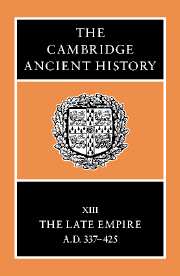Book contents
- Frontmatter
- PART I CHRONOLOGICAL OVERVIEW
- PART II GOVERNMENT AND INSTITUTIONS
- PART III THE EMPIRE: ECONOMY AND SOCIETY
- PART IV FOREIGN RELATIONS AND THE BARBARIAN WORLD
- PART V Religion
- 18 Polytheist religion and philosophy
- 19 Orthodoxy and heresy from the death of Constantine to the eve of the first council of Ephesus
- 20 Asceticism: pagan and Christian
- 21 Christianization and religious conflict
- PART VI ART AND CULTURE
- BIBLIOGRAPHY
- Index
- Map 1: The Roman empire in the late fourth century a.d.
- Map 2: Gaul and the German frontier
- Map 3: The Balkans and the Danube region
- Map 6: Asia Minor and the eastern provinces
- References
18 - Polytheist religion and philosophy
from PART V - Religion
Published online by Cambridge University Press: 28 March 2008
- Frontmatter
- PART I CHRONOLOGICAL OVERVIEW
- PART II GOVERNMENT AND INSTITUTIONS
- PART III THE EMPIRE: ECONOMY AND SOCIETY
- PART IV FOREIGN RELATIONS AND THE BARBARIAN WORLD
- PART V Religion
- 18 Polytheist religion and philosophy
- 19 Orthodoxy and heresy from the death of Constantine to the eve of the first council of Ephesus
- 20 Asceticism: pagan and Christian
- 21 Christianization and religious conflict
- PART VI ART AND CULTURE
- BIBLIOGRAPHY
- Index
- Map 1: The Roman empire in the late fourth century a.d.
- Map 2: Gaul and the German frontier
- Map 3: The Balkans and the Danube region
- Map 6: Asia Minor and the eastern provinces
- References
Summary
At Constantine's death, and for decades to come, polytheism could still be represented as Rome's natural religion, its ‘lawful cult’ (Lib. Or. XXX. 6; cf. Porph. ap. Eus. HE VI. 19.7). The gods who had protected and nourished one's ancestors and parents might still show themselves publicly, as did Athena on the walls of Athens in 395/6, to save her city from Alaric. When in 408 Alaric appeared at the gates of Rome itself, there were demands for the restoration of polytheist rites, and bishop Innocent – so it was claimed – was disposed to permit them, in private. Rome fell anyway. The Christians remained unabashed, for they deemed punishment of sin as much God's prerogative as the protection of the Earthly City. But it was undeniably a part of polytheism to secure such protection. So close, indeed, was the relationship between the old cults and the state that, in the opinion of some, ‘the ceremonies were not ritually accomplished if the state did not pay for them’ (Zos. IV. 59.3, V. 41.3). Taking its cue, then, from the vocal polytheist élite of Rome, whose vested interest it was to maintain the public cults, modern scholarship has held that ‘in the fourth century paganism appears as a kind of living corpse, which begins to collapse from the moment when the supporting hand of the State is withdrawn from it’. But the Roman senate's view of polytheism is too political, too formalist, to serve as a comprehensive gauge of the old gods' performance and popularity in the fourth century.
- Type
- Chapter
- Information
- The Cambridge Ancient History , pp. 538 - 560Publisher: Cambridge University PressPrint publication year: 1997
References
- 9
- Cited by

